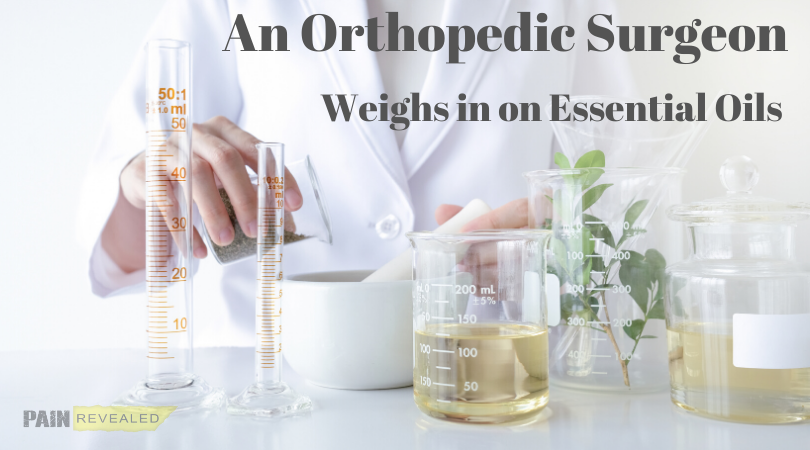Anyone on social media or interested in natural health options has heard of essential oils. It would be impossible to have missed this movement! Basically, “Essential oils are the oil-based aromatic extracts derived from the leaves, stems, fruit, bark, flowers, roots, or seeds of plants. They are a highly concentrated form of volatile oils — another name for essential oils — and have many beneficial properties.” (Hat tip to Pain Revealed Expert and Naturopath Dr. Edward Group for that info!)
Increasingly, people are turning to essential oils for their long list of uses and benefits.
While the use of essential oils has grown, traditional medical practitioners tend to express doubts that the benefits go beyond the placebo effect. That’s why it may come as a surprise to hear Harvard-trained orthopedic surgeon and Pain Revealed expert Paul Winterton, M.D. extoll their virtues. He asserts, “We have huge hospital systems where if you are not engaged in a very aggressive, not just present, but aggressive aromatherapy initiatives, you’re behind the times.”

Regarding oils and other therapies, he prefers to avoid the term “alternative.” Instead, he believes that “complementary modalities” is more accurate. He sees a variety of approaches as essential to holistic treatment of the patients who come to him.
Dr. Winterton sees a lot of pain in his Draper, Utah practice. He explains that pain is often considered as a vital sign. Patients are asked to rate their pain throughout their treatment process, and this is considered a key piece of information in making treatment decisions. While this step heightens caregiver awareness of patient pain, it also spotlights the need for solid options to opiates, sedatives, and NSAIDS.
Dr. Winterton describes himself as a man of science and hard numbers, and asserts that his trust in essential oils is backed by solid research. He explains that “Essential oil chemicals are immediately translated into neurochemistry and pharmaceutical activity.” In his practice, they are used for pain, inflammation, and nausea.
There is a neurochemical basis for the shift in perception of pain as evidenced by serotonin and dopamine level changes. PET scans of the amygdala evidence changes in vascular activity as a result of the use of essential oils. He adds that the science of this is certain to the point where there exist molecular models of how the active compounds of the oils attach to specific receptors.

He notes that inhaled aromatics are able via the lungs to enter the body systemically, and skin has absorptive capacity to deliver the compounds systemically.
Essential oils are also effective when applied topically to treat localized pain. He mentions that all of his postoperative patients receive an oral gel tab that offers oils on a sustained release basis. Studies support his assertion that essential oils will decrease the need for pain medication and anti-nausea medication postoperatively, and predicts that sustained-release and enteric-coated tablets for essential oils are a trend we will be seeing more of in the future.
Oils are just part of the quality doctor-patient relationship that Dr. Winterton believes that all caregivers should strive for. They are part of a greater picture of empowering treatment tailored to the individual. Complimentary modalities help patients to feel more involved and responsible for their own care, and support them in seeking options besides harmful opiates, sedatives, and NSAIDS. He states, “you really have to start seeing the patient from the moment they walk in not as a car engine, and you’re not a garage. It’s just plain good medicine.“

